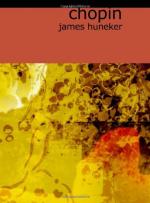The chronology of the concertos has given rise to controversy. The trouble arose from the F minor Concerto, it being numbered op. 21, although composed before the one in E minor. The former was published April, 1836; the latter September, 1833. The slow movement of the F minor Concerto was composed by Chopin during his passion for Constantia Gladowska. She was “the ideal” he mentions in his letters, the adagio of this concerto. This larghetto in A flat is a trifle too ornamental for my taste, mellifluous and serene as it is. The recitative is finely outlined. I think I like best the romanze of the E minor Concerto. It is less flowery. The C sharp minor part is imperious in its beauty, while the murmuring mystery of the close mounts to the imagination. The rondo is frolicksome, tricky, genial and genuine piano music. It is true the first movement is too long, too much in one set of keys, and the working-out section too much in the nature of a technical study. The first movement of the F minor far transcends it in breadth, passion and musical feeling, but it is short and there is no coda. Richard Burmeister has supplied the latter deficiency in a capitally made cadenza, which Paderewski plays. It is a complete summing up of the movement. The mazurka-like finale is very graceful and full of pure, sweet melody. This concerto is altogether more human than the E minor.
Both derive from Hummel and Field. The passage work is superior in design to that of the earlier masters, the general character episodical,—but episodes of rare worth and originality. As Ehlert says, “Noblesse oblige—and thus Chopin felt himself compelled to satisfy all demands exacted of a pianist, and wrote the unavoidable piano concerto. It was not consistent with his nature to express himself in broad terms. His lungs were too weak for the pace in seven league boots, so often required in a score. The trio and ’cello sonata were also tasks for whose accomplishment Nature did not design him. He must touch the keys by himself without being called upon to heed the players sitting next him. He is at his best when without formal restraint, he can create out of his inmost soul.”
“He must touch the keys by himself!” There you have summed up in a phrase the reason Chopin never succeeded in impressing his individuality upon the sonata form and his playing upon the masses. His was the lonely soul. George Sand knew this when she wrote, “He made an instrument speak the language of the infinite. Often in ten lines that a child might play he has introduced poems of unequalled elevation, dramas unrivalled in force and energy. He did not need the great material methods to find expression for his genius. Neither saxophone nor ophicleide was necessary for him to fill the soul with awe. Without church organ or human voice he inspired faith and enthusiasm.”




